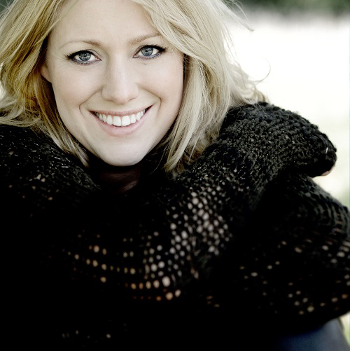The programme was clearly selected to show-case the qualities and
strengths of soprano Sophie Bevan. And, her vocal assets were immediately
evident in the opening work, Bach’s Falsche Welt, dir trau ich
nicht! (False world, I do not trust you! (1726)). The fine definition
of her phrasing, her evenness across the range, and the directness of
Bevan’s stage manner made for an immediate and captivating opening
recitative, which presents a sombre response to the Pharisees’
intention to trick Jesus, who has been preaching against them, into
betraying himself.
From the assertive falling sixth and tight rhythm of the opening
accusation, ‘Falsche Welt’, Bevan responded to every nuance in
the text and score, avoiding extravagant gesture and letting the inherently
dramatic music do the work. Vocal leaps were clean and the tuning of the
biting chromatic twists was spot on. The richness that was evident in the
anger conveyed here was strengthened in the confident assertions of the
following aria, ‘Immerlin, immerlin’ (No matter); the
repetitions of the short motif, ‘immerlin’, danced lightly and
the rapid running passages — in which Bevan was partnered by an agile
bass line — were gracefully nimble. In the central section, in which
celebrates the singer’s faith in God’s friendship despite the
falsity of the earthly world, Bevan revealed a plusher, fuller tone.
The triple-time second aria offered a calm contrast, ‘Ich halt es
mit dem lieben Gott’ (I put my faith in God; as the singer spurns the
world and joins with God, the oboes added to the lilting sweetness and
composure, while the off-beat interjections of bassoon and bass helped to
maintain rhythmic tension. Bevan’s singing was bright and joyful,
endearingly candid and unfussy.
The opening sinfonia of the cantata is an adaptation of Brandenburg
Concerto 1, and director John Butt and the players of Dunedin began in
ebullient fashion, the musical arguments thrown buoyantly between the
instrumental voices, with the pungent horns warmly supplementing the racing
semiquavers of the violins and oboes. The players’ dynamism and
clarity complemented the freshness of Bevan’s singing, although in
the chorale — which was originally scored for four voices —
single-handedly she could not quite match the strength of the horns.
Handel’s Alpestre monte (Alpine mountain) — written
during the composer’s Italian ‘apprenticeship’ and after
a perilous journey through the Alps — is perhaps more explicitly
dramatic, but also quite madrigalian and cinematic. The opening recitative
describes a Gothic terrain — ‘Triste albergo d’orror,/
Nido di fere,/ Fra l’ombre cupe e nere’ (sad refuge of fear,
lair of wild beasts in the gloomy shadows) — and the chromatic
contortions of the vocal line, atmospheric string playing and low vocal
register created a sinister, twisted mood. There was further expressive
sentiment from the strings in the following aria, ‘Is so ben
ch’il Vostro orrore’ (I know well that the horror you inspire),
and a stunning pianissimo which conveyed the potency of the
pathetic fallacy (‘As in this surrounding gloom, so my heart is
surrounded by shadows, horrible and fierce ghosts’).
Bevan treated the text luxuriantly in the recitatives, underscoring the
tragic intensity of a love that is so fierce, ‘Al fin perdei me
stesso,/ E il cor perdel’ (I ended up losing myself and losing my
heart). And, in the final aria (‘Almen dopo il fato’) she made
used of copious vocal light and shade, blending beautifully with the two
violins, and imbuing the falling lines with poignancy. The soprano also
appreciated — as is not always the case with soloists at the Wigmore
Hall — how to modify her voice for the size and acoustic of the
venue; and in so doing, she proved herself to be a real ‘singing
actress’.
Handel’s Gloria HWV deest was the final vocal item.
It’s a work which was only fairly recently identified as a Handel
work, when in 2001 Professor Hans Joachim Marx’s research —
while preparing a new edition of Handel’s Latin church music —
led him to deduce that Handel was indeed the composer. It’s virtuosic
in the extreme; but Bevan sang rings round the solo part — her
technical arsenal enabled her to despatch ornate melisma, long-breathed
phrases, rapid repetitions and octave transferences with ease. She also
enjoyed the musical rhetoric: the suspensions and sequences that entwine
with the vocal lines were teasingly articulated. The vocal delivery implied
an insouciance which cheekily contradicted the sincerity of the text!
— most especially when the ‘Amen’, switching to a duple
metre, took off precipitously, and joyously.
The players of Dunedin also got their chance to shine, in instrumental
works woven between the vocal items. Bach’s Fourth Brandenburg
Concerto was rhythmically alert (hemiolas rarely sound this theatrical!),
airy of texture, the phrasing by turns punchy and warmly rounded. Cecilia
Bernardini’s solo violin phrases were elegantly shaped, while the
recorder solos of Catherine Latham and Pamela Thorby had great character.
My only query was whether Butt needed to work quite so hard, cueing all and
sundry, and maintaining a dynamic presence throughout, when his players
seemed to have an innate appreciation of the festive spirit which he sought
to capture? Contrast, vibrancy and revelry were also features of
Handel’s Concerto Grosso in Bb Op.3 No.2 (though why were the two
oboes hidden away behind the string ripieno?).
In 2013 Bevan was awarded the ‘Young Singer’ award at the
inaugural 2013 International Opera Awards. This was an enchanting
performance which confirmed her vocal stature and maturity, and her stage
presence.
Claire Seymour
Performers and programme:
Dunedin Consort: John Butt — director/harpsichord, Sophie
Bevan — soprano, Cecilia Bernardini — violin, Pamela Thorby
& Catherine Latham — recorder
J.S. Bach — Cantata: Falsche Welt, dir trau ich
nicht BWV52, Brandenburg Concerto No.4 in G major BWV1049; Handel
— Cantata:Alpestre monte HWV81, Concerto Grosso in B flat
major Op.3 No.2 HWV313, Gloria HWV deest. Wigmore Hall, London,
Friday 26 th February 2016.
